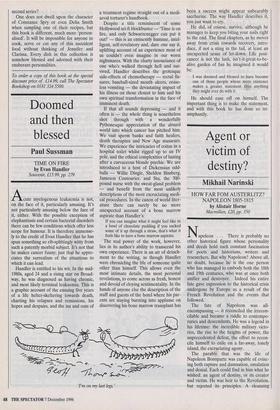Doomed and then blessed
Paul Sussman
TIME ON FIRE by Evan Handler Souvenir, £15.99, pp. 279 Acute myelogenous leukaemia is not, on the face of it, particularly amusing. It's not particularly amusing below the face of it, either. With the possible exception of elephantiasis and certain bacterial disorders there can be few conditions which offer less scope for humour. It is therefore immense- ly to the credit of Evan Handler that he has spun something so rib-splittingly witty from such a patently morbid subject. It's not that he makes cancer funny; just that he appre- ciates the surrealism of the situations to which it can lead.
Handler is entitled to his wit. In the mid- 1980s, aged 24 and a rising star on Broad- way, he was diagnosed as having chronic, and most likely terminal leukaemia. This is a graphic account of the ensuing five years of a life helter-skeltering towards death, charting his relapses and remissions, his hopes and despairs, and the ins and outs of a treatment regime straight out of a medi- aeval torturer's handbook.
Despite a title reminiscent of some Hollywood sci-fi blockbuster — 'Time is on fire, and only Schwarzenegger can put it out!' — this is an eminently humane, intel- ligent, self-revelatory and, dare one say it, uplifting account of an experience most of us couldn't even imagine in our worst nightmares. With the chatty insouciance of one who's walked through hell and sur- vived, Handler describes the grotesque side-effects of chemotherapy — rectal fis- sures, baseball-sized mouth ulcers, cease- less vomiting — the devastating impact of his illness on those closest to him and his own spiritual transformation in the face of imminent death.
If that all sounds depressing — and it often is — the whole thing is nonetheless shot through with a wonderfully Pythonesque appreciation of the absurd world into which cancer has pitched him. We visit sperm banks and faith healers, death therapists and New Age masseurs. We experience the intricacies of coitus in a hospital toilet whilst rigged up to an IV pole, and the ethical complexities of lusting after a curvaceous blonde psychic. We are introduced to a host of Dickensian odd- balls — Willie Dingle, Sheldon Bimberg, Jameson Coutourier, and Stu, the 300- pound nurse with the sweat-gland problem — and benefit from the most unlikely descriptions of the most excruciating medi- cal procedures. In the canon of world liter- ature there can surely be no more unexpected account of a bone marrow aspirate than Handler's:
If you can imagine what it might feel like to a bowl of chocolate pudding if you sucked some of it up through a straw, that's what it
feels like to have a bone marrow aspirate.
The real power of the work, however, lies in its author's ability to transcend his own experience. There is an air of detach- ment to the writing, as though Handler were chronicling the life of someone quite other than himself. This allows even the most intimate details, the most personal revelations, to come across as fresh, honest and devoid of cloying sentimentality. In the hands of anyone else the description of the staff and guests of the hotel where his par- ents are staying bursting into applause on discovering his bone marrow transplant has 'I'm on my last legs.' been a success might appear unbearably saccharine. The way Handier describes it, you just want to cry.
He did, of course, survive, although he manages to keep you biting your nails right to the end. The final chapters, as he moves away from crisis towards recovery, intro- duce, if not a sting in the tail, at least an unexpected sense of let-down. Life post- cancer is not the lush, isn't-it-great-to-be- alive garden of fun he imagined it would be: I was doomed and blessed to have become one of those people whose mere existence makes a greater statement tIOn anything they might ever do with it.
He should ease off on himself. The important thing is to make the statement, and with this book he has done so tri- umphantly.


















































































 Previous page
Previous page